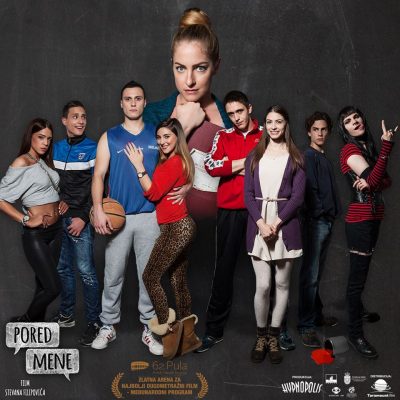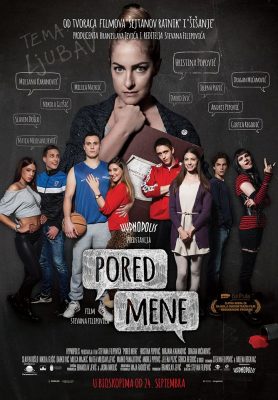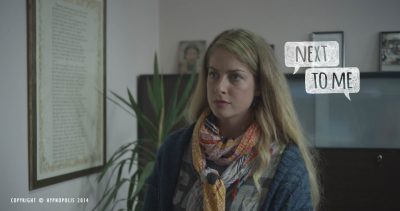By
Marcus Agar
When a Serbian film makes waves beyond the domestic market, critics and audiences sit up and pay attention.
As thought-provoking and socially relevant high school drama Pored Mene (Next to Me) clocks up international awards and acclaim, the signs are strong for this will translate into bums on seats.
Next to Me, the latest cinema release from one of Serbia’s leading young writer-directors Stevan Filipovic was a champion right out of the blocks.
After being named Best Film on its world premiere at last month’s Pula International Film Festival, it showed that this honour was not a fluke by also winning the Young Audience Award at the Sarajevo Film Festival.
Sensing that they were on to something special, international film critics, including the Hollywood Reporter, soon added their acclaim.
Politics and drama at a Belgrade high school
The story is a simple one: a group of teenagers with only their school room in common are forced to face up to their personal struggles and traumas, with enlightening and life-changing results for some of them.
The device that triggers it all is a nighttime attack by a group of teenagers on idealistic Belgrade teacher Olja (Hristina Popovic: Circles and The Parade), who is ridiculed for her left-leaning views.
When a controversial exhibition by her artist husband Uglješa (Dragan Micanovic: Coriolanus, RocknRolla, Layer Cake) provokes Serbian nationalists, a gang of masked youths think that the teacher needs to be taught a lesson.
The following morning Olja catches some boys watching the attack on YouTube but her class refuses to reveal the offenders. Seeing red, she confiscates their mobile phones, bolts the doors and leaves the teenagers alone in the rundown school overnight.
Serb teens in drink, drugs and sex rampage
At first, the over-exuberant youths let off steam in a drink-drunk-sex fuelled rampage through the school. But before long, they split into groups and talk in ways that would have seemed out of the question during a normal school day.
As their attitudes, opinions and anxieties surface, the students are forced to face up to themselves and each other. Before long emotions run high, secrets are shared and true feelings are revealed. To varying effect.
By interlacing the universal stories and hang ups of a class of typical teenage characters, Stevan creates a familiarity that is at once both comforting and disturbing, as well as being accessible to audiences at home as well as abroad.
By painting most of the characters in this ensemble story as fairly formulaic cut-outs, Stevan is able to set out themes and issues around realistic dialogue and exchanges.
Serbia’s right-wing views and immoral elite
Growing right-wing views among young people, a lack of community and social responsibility, an immoral elite and Serbia’s virtual no-go subject of homosexuality are all handled with an unpatronising honesty and with feeling and a familiarity that helps the story translate beyond the subtitles.
In the hands of a skilled and socially adept director like Stevan Filipovic, an everyday story can reflect the raw concerns and fears of a uneasy society.
Like the painful honesty of a mirror revealing the shock of passing years, reality can be uncomfortable to face. But hard truths must be heard if lessons are to be learned.
This skilfully nuanced drama sees Belgrade-based Stevan Filipovic return to the timely themes of social disparity, political apathy, disenchanted youth and deep-rooted nationalism that were so vividly portrayed in his previous film, Skinning / Šišanje.
While smashing the Serbian box office in 2010, that controversial film about Belgrade’s neo-Nazi skinheads and football hooligans earned as many death threats as awards for its uncompromising director.
Stevan is unflinching in his issues and themes and, although this time round the delivery might be subtler and less in-your-face violent, the impact is no less effective. Current rumblings in society also make the issues addressed here all the more essential.
Mirjana Karanovic as Serbia’s grande dame
Apart from a brief cameo-like appearance by esteemed Serbian actress Mirjana Karanovic (Esma’s Secret/Grbabvica, Underground) as a dismissive head teacher and the refreshingly naturalistic performance of Hristina Popovic as the victim of the attack, young actor Slaven Došlo stands out from the student crowd.
His scene-stealing performance as the cock-sure wide-boy Lazar who is attracted to class jock Strahinja (Nikola Glisic) is not easy to pull off with any credibility.
It takes subtlety and restraint to turn in a believable over-the-top performance that faithfully hints at the insecurities and conflict beneath the ebullient exterior of a teenager coping with his gay awakening.
It is a sad indictment of a society that struggles with homophobia and prejudice that we should give extra credit to Slaven for even taking on the role of a gay teenager in a major cinema release.
In a Serbia where finger-pointing and jokes could be his least concern, Slaven had doubts and deeply felt concerns about his personal safety before accepting the gay role.
Based on his performance here, it was a good move for him and for us.
Serbian tribute to eighties classic The Breakfast Club
Comparisons to John Hughes’ The Breakfast Club are obvious and unavoidable but, thanks to making the story and characters relevant to a new generation, the similarities enhance the experience for anyone familiar with the 80s classic rather than jerk them out of the scene.
Audience-savvy Stevan also shows a deft hand at tapping into teenage concerns by subtly referencing contemporary TV and teen slang, while peppering locally relevant issues alongside universal themes.
In Next to Me (Pored Mene) Stevan Filipovic has delivered an engaging film that addresses local social issues within the framework of an enjoyable, timely and surprisingly feel-good story with universal appeal.
Produced by Hypnopolis, Next to Me was released in Serbia on 23 September through Taramount Film and will be screened at London’s Raindance Independent Film Festival on 2 and 3 October.
This article was originally published in Wild Rooster on 23 September and is reproduced with the kind permission of Marcus Agar.







No Comments Yet!
You can be first to comment this post!